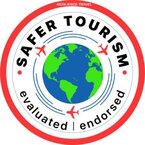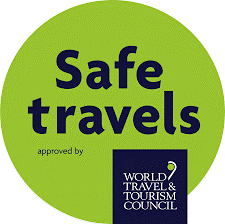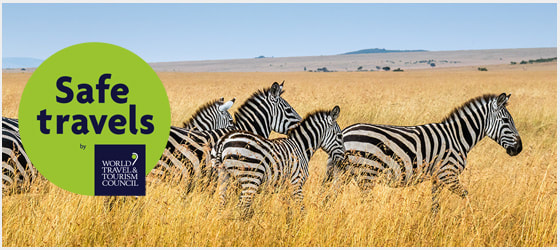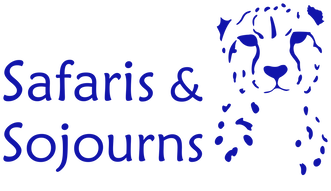Nature, Fresh Air, Space and Freedom
|
Obviously, our world has changed dramatically as a result of this pandemic. Is it safe to travel? Where is it safe to travel?
As we begin to travel again with the presence of COVID-19, we anticipate responding to these trends:
|
|

There is a “New Normal”. Transportation companies, escorts/guides and accommodations (hotels, lodges, safari camps) are each instituting health protocols for operating under the threat of COVID-19. For the safety of our clients, we select only those in-country partners that have demonstrated adherence to COVID-19 protocols. In recognition to our diligence and care in arranging our programs with regard to COVID-19 protocols, Safaris & Sojourns has been evaluated and endorsed as a Safer Tourism organization.

The World Travel & Tourism Council (WTTC) has instituted a certification program called “Safe Travels” to assure compliance with worldwide health standards and sanitation protocols. The Safe Travels certificate can be issued to an individual property, DMC or attraction or to a region or a country. Kenya was the first country to be certified by Safe Travels in July 2020.
Safe Travels certification proclaims that industry best practices are being adhered to in placing the safety, security and health of travellers and the Travel & Tours workforce at the core of operational protocols. The certification program covers a broad range of safety measures in transport, accommodation and health conditions for tourists and hospitality employees alike. It validates the execution of strict health and hygiene requirements at airlines, airports, and other transport facilities, as well as in accommodation outlets and food and beverage venues.
At present we are not encouraging travel to destinations that would typically include several days in large cities or to densely populated countries. Notable exceptions would be Iceland, New Zealand, Australia, and Nepal which have a low population density and have successfully managed the COVID-19 situation being among the first countries to reopen to tourism. Sightseeing and activities in each of these four focuses on being outdoors and each can offer boutique accommodations outside of the urban areas – and your program can be arranged as a private journey or self-drive.
We would recommend to consider exploring more remote, low population density places such as the Amazon rainforest, Patagonia, Atacama Desert, Madagascar, Botswana or Namibia. Furthermore, many countries, particularly the safari countries of Africa, are requiring that travellers must arrive with proof of a negative COVID-19 PCR test issued days prior in order to enter the country. This means that everyone on your flight has been certified COVID-19 free prior to boarding which greatly reduces your travel risk to those countries. Consequently, making it safer to fly to Africa than to Europe.
An African safari remains the best possible trip for remoteness, low population density and isolation. Because of COVID-19 we all want to avoid crowded places and keep our distance - that describes an African safari under normal circumstance. Our objective for every safari is to immerse our clients in nature, fresh air, space and freedom without compromising on comfort. Our desire is for you to have authentic experiences and to truly connect to Africa.
We prefer selecting boutique hotels, lodges or camps with a small number of rooms. Many of the properties we use have only 6-12 rooms, which are spaced out to ensure minimum contact with other guests and take privacy as an integral part of the experience. Even their central areas are designed and curated to give everyone space. You’re never in a crowd which is not new for us but more the norm in much of the safari industry.
These smaller properties are available at a number of price points so there is more accessibility than one might expect. However, for those looking for the ultimate in isolation a completely private safari can be arranged including ‘Exclusive-Use’ lodging with your own staff, private safari guides, private safari vehicles and private transfers (by road or air). Or if you have a small group of family and friends you can take over an entire camp for exclusive-use.
Furthermore, most safari camps benefit from the fact that their staff is resident at the property. Because of each camp’s remoteness staff don’t leave the camp for weeks or months at a time, thus their only potential exposure to COVID-19 is from you, their guests. Additionally, they are well versed in the protocols to keep you and themselves safe.
Be it a Safari or a Sojourn we want you to feel confident and comfortable that reasonable precautions are in place for you to safely venture out into the world with a minimal risk of exposure to COVID-19.
Safe Travels certification proclaims that industry best practices are being adhered to in placing the safety, security and health of travellers and the Travel & Tours workforce at the core of operational protocols. The certification program covers a broad range of safety measures in transport, accommodation and health conditions for tourists and hospitality employees alike. It validates the execution of strict health and hygiene requirements at airlines, airports, and other transport facilities, as well as in accommodation outlets and food and beverage venues.
At present we are not encouraging travel to destinations that would typically include several days in large cities or to densely populated countries. Notable exceptions would be Iceland, New Zealand, Australia, and Nepal which have a low population density and have successfully managed the COVID-19 situation being among the first countries to reopen to tourism. Sightseeing and activities in each of these four focuses on being outdoors and each can offer boutique accommodations outside of the urban areas – and your program can be arranged as a private journey or self-drive.
We would recommend to consider exploring more remote, low population density places such as the Amazon rainforest, Patagonia, Atacama Desert, Madagascar, Botswana or Namibia. Furthermore, many countries, particularly the safari countries of Africa, are requiring that travellers must arrive with proof of a negative COVID-19 PCR test issued days prior in order to enter the country. This means that everyone on your flight has been certified COVID-19 free prior to boarding which greatly reduces your travel risk to those countries. Consequently, making it safer to fly to Africa than to Europe.
An African safari remains the best possible trip for remoteness, low population density and isolation. Because of COVID-19 we all want to avoid crowded places and keep our distance - that describes an African safari under normal circumstance. Our objective for every safari is to immerse our clients in nature, fresh air, space and freedom without compromising on comfort. Our desire is for you to have authentic experiences and to truly connect to Africa.
We prefer selecting boutique hotels, lodges or camps with a small number of rooms. Many of the properties we use have only 6-12 rooms, which are spaced out to ensure minimum contact with other guests and take privacy as an integral part of the experience. Even their central areas are designed and curated to give everyone space. You’re never in a crowd which is not new for us but more the norm in much of the safari industry.
These smaller properties are available at a number of price points so there is more accessibility than one might expect. However, for those looking for the ultimate in isolation a completely private safari can be arranged including ‘Exclusive-Use’ lodging with your own staff, private safari guides, private safari vehicles and private transfers (by road or air). Or if you have a small group of family and friends you can take over an entire camp for exclusive-use.
Furthermore, most safari camps benefit from the fact that their staff is resident at the property. Because of each camp’s remoteness staff don’t leave the camp for weeks or months at a time, thus their only potential exposure to COVID-19 is from you, their guests. Additionally, they are well versed in the protocols to keep you and themselves safe.
Be it a Safari or a Sojourn we want you to feel confident and comfortable that reasonable precautions are in place for you to safely venture out into the world with a minimal risk of exposure to COVID-19.
Philanthropic Support: The COVID-19 pandemic has been extremely detrimental to conservation efforts and the protection of Africa's wildlife. The absence of tourism revenue from safaris to employ rangers and anti-poaching units has resulted in drastic staffing cutbacks. Gone also are the safari vehicles traversing wildlife areas which are a significant deterrent to poachers. Consequently, poaching has risen sharply during the pandemic shutdown. To assist with the the protection and preservation of wildlife, Safaris & Sojourns has funded these pandemic-initiated campaigns: "Adopt an Acre" (Masai Mara, Kenya), the KAI Foundation in support of "Care for Rangers" and the "Uganda Wildlife Authority" (Uganda), and The Bushcamp Company's "Friends of Charity Begins At Home" (South Luangwa, Zambia).


